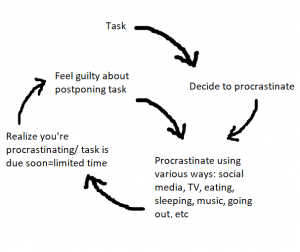Going Down the Procrastination Hole? 8 Steps to Getting Back on Track
Alas, midterm season is upon us and will continue until the last week of classes. Whether you’re desperately last-minute studying or studying right after every lecture, there’s something we all succumb to: procrastination.
Sometimes procrastination is followed by guilt that arises out of disappointment in ourselves. During my first year of university (2017-18), I experienced the guilt frequently, which led to more procrastination.
The guilt often escalated into other emotions such as panic and stress, ones that I’m sure many of you are feeling right now. Having a combination of these emotions halted my productivity and sent me down a hole of self-criticism.
Since realizing I was stuck in an unhealthy cycle, I have worked on trying to stop procrastinating. Below, I have come up with 8 steps to take when you want to reduce procrastination and I hope you’ll be able to find at least one helpful tip!
1. Acknowledge that you procrastinated and be okay with it
Spending a long time regretting your decision to procrastinate isn’t going to help you and will instead make you feel worse and less productive.
2. Figure out what task you were supposed to do but postponed
Not sure which task to do first because you put off too many tasks? Two options: Begin with the smallest task that seemed too easy to complete so you put it off thinking it wouldn’t take long OR start with whatever is due first. Sorting your assignments and deadlines based on time will help you prioritize what to tackle first.
3. Break the task into smaller parts
Beginning with something small will make it easier to accomplish because it will give you a starting point.
4. Don’t force yourself to finish within an unrealistic time frame
Having a time restriction on when you want to finish is good – until it becomes unreasonable when you overestimate your work ethic. Although this can be hard at first, as the year goes by, you’ll come to a better understanding of how long it takes you to finish certain tasks.
5. Disconnect from technology
If you’re not going to use the internet for anything, disconnect. You’ll be surprised at how many times you try to connect again, persuading yourself that you need a break or that someone could’ve messaged you. Also, log out of social media accounts. The platforms are incredibly easy to access, making it second nature to check frequently. Lastly, put your phone somewhere hard to reach (eg. closet, desk drawer, or even give it to someone to guard).

One of my favourite foods to snack on: french toast with honey and strawberries! Although delicious, it takes time to make, which means less studying time.
6. Minimize excuses to stop
I have had so many extra snacks because I use it as an excuse to get up after only studying for 10 minutes. Instead, give yourself a scheduled break so you can relax and grab a bite to eat.
(Here is a great blog post all about taking breaks.)
7. Don’t switch between multiple tasks
Switching between many tasks will make it easier to lose focus and momentum. I suggest completing a task of one kind then switching to a task that requires different skills. For example, if I have to do lots of reading for one class, I’ll finish one chapter then move on to re-writing notes for another class. I find that this way, you don’t feel like you’ve been doing the same thing for a long time.
8. Aim to cross off ONE task
Once you cross off the first one, you’ll feel instantly better that you’ve completed something, which will hopefully motivate you to tackle other tasks.
Let me know if you use any of these tips or if you have any tips that really work for you! Wishing you all the best of luck with your upcoming deadlines and remember that this doesn’t happen overnight – it’s a long process and I’m still working on it as well!





